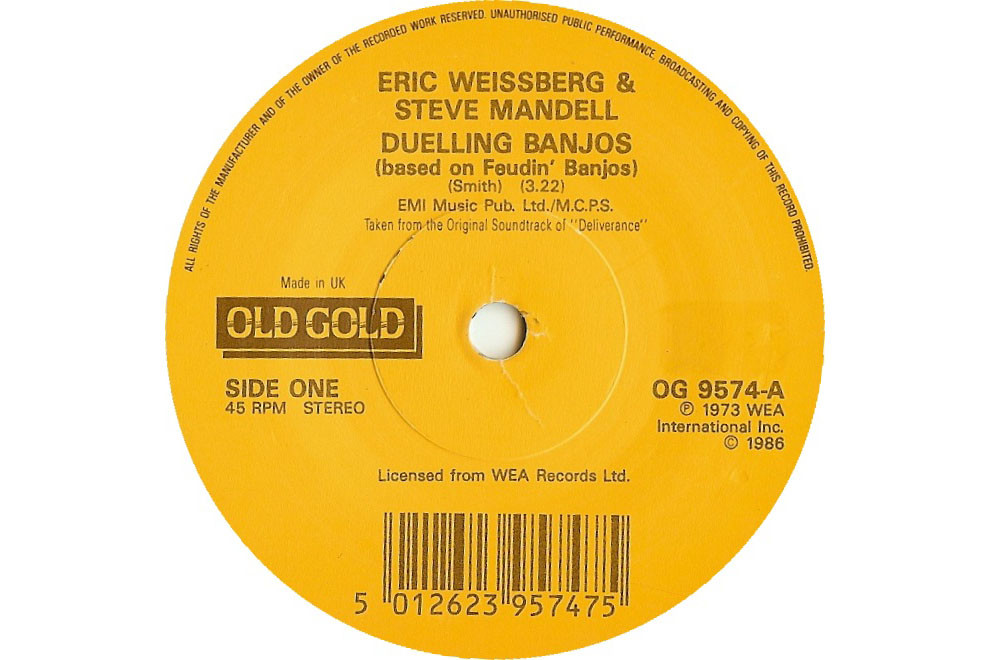Owings Mills resident Steve Mandell, a celebrated and accomplished musician best known for his 1973 international smash hit “Dueling Banjos” with Eric Weissberg from the film “Deliverance,” died yesterday after a long battle with prostate cancer. He was 76.
“He was a special guy and we had some wonderful, magical, musical times together for 43 years, which is unusual these days,” said his wife, Terry, who met her husband at a Judy Collins concert at Southern Illinois University in August of 1973.

In a Facebook post, the Mandells’ son, Josh, wrote, “Dad, you will truly be missed by all of the lives you have touched with your incredible music, gigantic smile and slapstick humor. To many, my dad was a legend. And they are absolutely right, my father is legendary, but to me he was always just Dad. From talking sports or politics and everything in between, to our family trips, to us both screaming at the TV during Ravens games, I will cherish the memories I have from the past 24 years. I love you, Dad. I hope you are up there picking away with your friends.”

A member of Temple Emanuel and Baltimore Hebrew Congregation, Mandell grew up in Westchester County, N.Y., and was a staple and in-demand session musician in New York’s thriving folk community in the early 1960s, getting his start with the group the Garrett Mountain Boys (which included future acclaimed mandolinist David Grisman).
A guitarist and banjo player, he performed in concerts and on albums with such music legends as Collins, Bobby Darin, Grisman, Tracy Nelson, Roger McGuinn, Lou Reed and John Denver, and he was in the studio when his longtime friend Don McLean recorded his 1971 classic “American Pie.”
But Mandell was best known for his own iconic hit “Dueling Banjos,” which reached the number two position for four weeks on the Billboard Hot 100 in early 1973. Mandell played acoustic guitar while Weissberg played five-string banjo on the track.
Mandell had been contacted by Weissberg — also a New York-based session musician who recorded with Bob Dylan, Tom Paxton and others — to perform on the soundtrack for “Deliverance,” based on Southern poet James Dickey’s best-selling novel of the same name. Mandell and Weissberg traveled to Atlanta to attend the film’s shooting and to coach the actors in miming the song in a now-famous musical exchange scene between a mute country boy character and a suburbanite visitor.
In the fall of 1972, Warner Bros. released the film starring Burt Reynolds, Jon Voight and Ned Beatty, and “Dueling Banjos” received so much attention from the public that the company released the Weissberg/Mandell song as a single, unbeknownst to the musicians.
The Grammy Award-winning, Golden Globes-nominated instrumental — which was not written but co-arranged by Mandell and Weissberg — was the catalyst for a revival of interest in bluegrass music and the banjo, as well as fodder for seemingly countless parodies and TV commercials. Contemporary banjo virtuoso Bela Fleck has cited “Dueling Banjos” as whetting his appetite for the instrument.

A characteristically modest man, Mandell took great pride in the song’s success as well as that of the “Deliverance” soundtrack. “Dueling Banjos” turned out to be a one-hit wonder, but Weissberg and Mandell formed a band called Deliverance (with Charlie Brown, Tony Brown and Richard Crooks) and played state fairs, colleges and other venues, as well as appeared on TV.
Mandell also worked on Broadway and off-Broadway, and recorded advertising jingles.
“Steve was far from a one-trick pony,” read an obituary from the website of the Roanoke, Va.-based Bluegrass Today. “He could play and sing hundreds of songs from the bluegrass canon. He was a regular at jams, concerts and music camps in the region, eagerly sharing his vast knowledge with anyone who asked.”
Mandell eventually retired from the music business and worked in audio/video and home theater sales for such companies at Circuit City and Best Buy, and he relocated to the Baltimore area from New York in 1988. He retired in 2006.
But Mandell still enjoyed playing music in his home for his own amusement, while admitting his fingers were not as nimble for picking banjo tunes as they once were.
“I’ve been playing this [folk and bluegrass] music for more than 50 years and I’ve had my time,” Mandell told the Carroll County Times in 2013. “The new [bluegrass] players are coming up. They are just amazing.”

Mandell was a strong supporter of Common Ground on the HIll, an annual roots music and arts festival in Westminster, and the annual Charm City Bluegrass Festival. In addition, Mandell was instrumental in organizing fund-raising concerts for Temple Emanuel when the congregation was located in Reisterstown. He also served as a judge at the Deer Creek Fiddlers’ Convention at the Carroll County Farm Museum in Westminster.
“Steve exuded joy. Simple as all that,” said Rabbi Gustav Buchdahl, Emanuel Emeritus Rabbi at Baltimore Hebrew Congregation. “Whether he was playing the banjo, engaging in casual conversation, worshiping, what one felt was his pleasure at being alive and participating in whatever the moment demanded. He was devoted to his wife, his son, his fraternity of fellow bluegrass musicians, his synagogue family.
“Behind his modesty, Steve was no pushover. If he felt passionately about something, he was a force with which to contend. To be his rabbi was one of the rewards of my career.”
When contacted by Jmore at their family home in Woodstock, N.Y., Juliet Weissberg said her husband Eric, now 78 and in challenging health, did not know of Mandell’s passing. “I didn’t personally know Steve, but we might’ve met years ago,” she said. “They did keep in touch, mainly through email. They were good friends way back, but hadn’t seen each other in many years. He’ll be sorry to hear about Steve, of course.”
Mandell’s funeral will be held on Friday, March 16, at noon at Sol Levinson & Bros., 8900 Reisterstown Rd. in Pikesville.
He is survived by his wife of 43 years, Terry A.(Steinberg) Mandell, his son, Joshua, and his sister, Elaine (Stephen) Stiles. Memorial contributions may be sent to the Bluegrass Trust Fund, c/o IBMA, 4206 Gallatin Pike, Nashville, Tenn., 37216, or to Common Ground On the Hill, 2 College Hill, McDaniel College, Westminster, Md., 21157.





